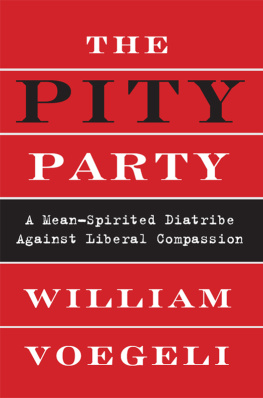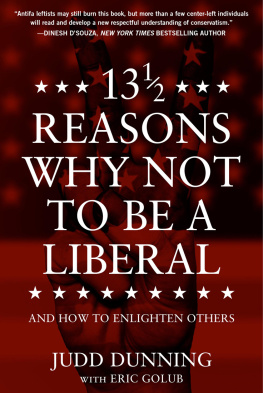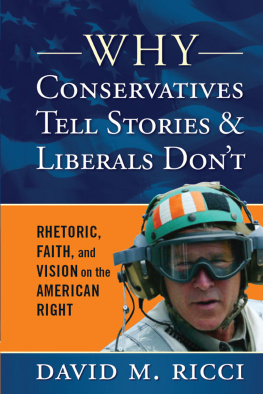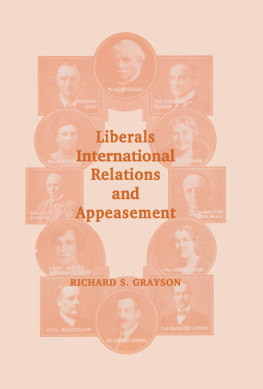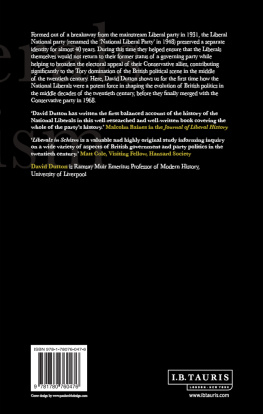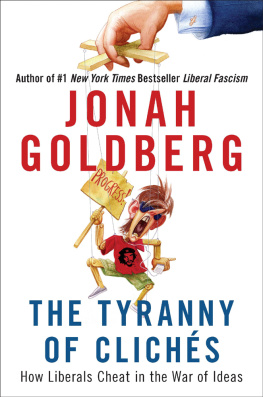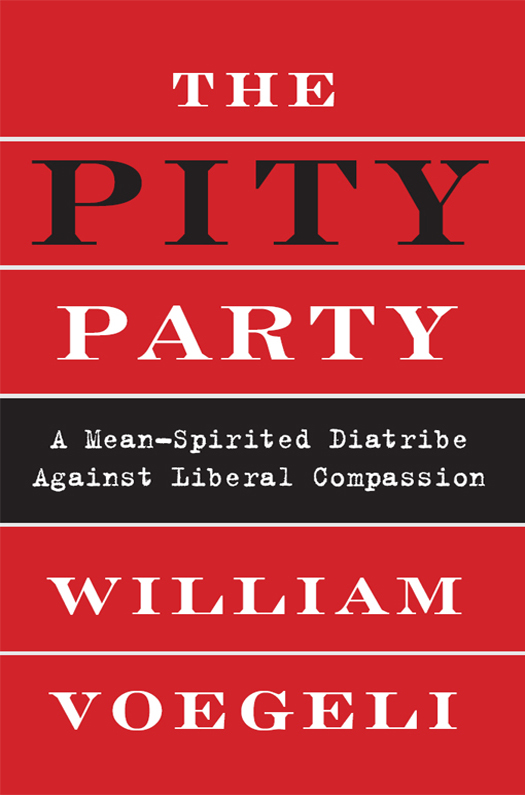F OR MY PARENTS
T heres a very good chance that I never would have started this book without encouragement from Adam Bellow, who became its editor. Once I did begin writing, theres an even better chance I never would have finished it without his help. Im grateful to Adam and his colleagues at HarperCollins, in particular Eric Meyers, Broadside Books associate editor, and Tom Pitoniak. Im equally indebted to Carol Mann of the Carol Mann Agency for her reassurance and wise counsel.
I worked on Pity Party to the detriment of my obligations to the Claremont Review of Books, and with the help of my colleagues there: Patrick Collins, Lindsay Eberhardt, Christopher Flannery, Charles Kesler, John Kienker, and Ryan Williams. I also thank Brian Kennedy, CRBs publisher in his capacity as the president of the Claremont Institute, and Tom Klingenstein, the institutes chairman. I am fortunate as well to be affiliated with Claremont McKenna Colleges Henry Salvatori Center, and I am grateful to Mark Blitz, the centers director, and Elvia Huerta, its administrator, for their help.
My deepest debt is to Martha and Bailey, my wife and stepdaughter, the best reasons I could have to turn the computer on, day after day, and grind out more paragraphs.
This book is dedicated, with great affection, to Beverly and Robert Jones, and to Carol and the late William J. Voegeli.
CONTENTS
T he accomplished actor had read better lines, but none better suited to that particular stage, audience, and moment. Eighteen years after Superman had made the absurdly handsome Christopher Reeve a movie star, one year after an equestrian accident had left him a quadriplegic, Reeve addressed the 1996 Democratic National Convention. The amount of federal funding for research on spinal cord injuries, he declared, was deplorably meager. More spending would give Americans afflicted by injuries like his a better quality of life, allow them to become economically productive, and even give them hope for a complete recovery. He went on to urge increased government spending for research on the causes and cures of other ailments, naming Parkinsons disease, stroke, multiple sclerosis, and AIDS, along with famous people who suffered from each. Reeve closed by invoking another man in a wheelchair, Franklin Roosevelt, telling the delegates that FDRs most important principle was America does not let its needy citizens fend for themselves.
Who could hear that speaker give that speech and object to the additional funding Reeve endorsed? No one, of coursewhich was the whole point, and the whole problem. The quality of the arguments and evidence Reeve offered was irrelevant, and any rebuttal would have been futile. The strategy of placing him in that setting before a national television audience was not to win a political debate but to preclude one. The emotional force of Reeves speech reminds us why Aristotle examined compassion, which we treat as a moral virtue, in the Rhetoric, discussing it solely in terms of the power to move an audience. He does not mention the subject in the Ethics or the Politics.
Reeves appearance was perfectly consonant with the central purpose of the 1996 convention: renominating and reelecting President Bill Clinton, who had assured voters four years before, I feel your pain. Clintons skill set included speaking empathy fluently, which only compounded the difficulties of his less-talented vice president, Al Gore, who expressed himself in that idiom forcefully but ineptly, a speaker of a second language never mastered. Gore concluded his 1996 acceptance speech with an account of his sisters deathbed as she succumbed to lung cancer, three decades after becoming a heavy smoker. And that is why until I draw my last breath, he told the delegates, I will pour my heart and soul into the cause of protecting our children from the dangers of smoking.
At the 2000 Democratic convention, Gores first act upon accepting the presidential nomination was to share with his wife, onstage before a television audience, a kiss the Associated Press described as awkward and uncomfortably long. Even for a notably unsubtle politician, it was a blatant signal to voters that a Gore presidency would, unlike Clintons, spare the nation bimbo eruptions and amorous interns. What the self-defeating phoniness of Gores authenticity really made clear, however, was that Clinton had already established the outer limit of the Empathizer in Chief role, requiring his successors to try something different rather than attempt more of the same. The next Democratic president turned out to be Barack Obama, who is always effortlessly cool and measured in public. Its impossible to imagine him giving his wife an openmouthed kiss on national television.
So central is the rhetoric of compassion to modern American liberalism, however, that even a reserved politician like Obama relies on it constantly. And, like Gore, he avails himself of the principle that if an autobiographical snippet conveys a politically resonant emotional truth, the speaker has no obligation, and the audience no right, to be exacting about its literal truth. In a 2008 debate against Senator John McCain, Obama said, For my mother to die of cancer at the age of fifty-three and have to spend the last months of her life in the hospital room arguing with insurance companies because theyre saying that this may be a preexisting condition and they dont have to pay her treatment, theres something fundamentally wrong about that. A 2012 biography of his mother, Stanley Ann Dunham, revealed, however, that health insurance did pay for her medical care, and she argued with an insurance company about benefits from a disability policy. When asked by reporters about the discrepancy, the White House did not dispute the books account, but took what refuge it could in the statement The president has told this story based on his recollection of events that took place more than fifteen years ago.
Nevertheless, in a subsequent 2012 campaign video Obama attempted to have it both ways, conveying that his mother had suffered because of poor health insurance but without explicitly repeating the contentions he had made in 2008. In the 2012 documentary, Michelle Obama says of her mother-in-law, She developed ovarian cancer, never really had good, consistent insurance. Thats a tough thing to deal with, watching your mother die of something that could have been prevented. I dont think he wants to see anyone go through that. The films narrator then explains that Obamas personal tragedy left him sensitive to the suffering of others, and determined to alleviate it: And he remembered the millions of families like his who feel the pressure of rising costs and the fear of being denied or dropped from coverage.
Obama did not mention his mother at the White House ceremony in March 2010 when he signed into law the Patient Protection and Affordable Care Act (more commonly referred to as the Affordable Care Act or, simply, Obamacare). Standing next to him at the desk, however, was an eleven-year-old boy, Marcelas Owens, whose mother had died of pulmonary hypertension in 2007, at age twenty-seven. She didnt have insurance and couldnt afford the care that she needed, Obama said. He went on to say he was also signing the bill for Natoma Canfield, whose sister was in attendance. Canfield had to give up her health coverage after her rates were jacked up by more than forty percent, the president explained. She was terrified that an illness would mean shed lose the house that her parents built, so she gave up her insurance. And now shes lying in a hospital bed, as we speak, faced with just such an illness, praying that she can somehow afford to get well without insurance.

